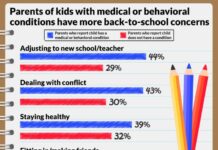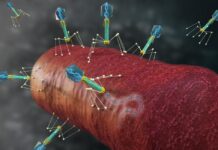Atrial fibrillation (also called AFib or AF) is a quivering or irregular heartbeat (arrhythmia). Some people refer to AF as a quivering heart. An estimated 2.7 million Americans are living with AF. Atrial fibrillation is a common cause of stroke.
Silent cerebral infarction (SCI), or “silent stroke,” is a brain injury likely caused by a blood clot interrupting blood flow in the brain. It’s a risk factor for future strokes which could lead to progressive brain damage due to these strokes. Silent strokes are known to occur in the presence and absence of AF, but the association between these disorders has not been well-defined.
According to Dr. Shadi Kalantarian, MD, MPH, Resident Physician at Yale-New Haven Hospital and review author “Patients with atrial fibrillation are at higher risk of developing silent strokes.”
Dr. Kalantarian and colleagues from, Massachusetts General Hospital estimated the association between AF and SCIs and the prevalence of SCIs in stroke-free patients with AF.
For the study researchers searched MEDLINE, PsycINFO, Cochrane Library, CINAHL, and EMBASE from inception to 8 May 2014 for observational studies involving adults with AF and no clinical history of stroke or prosthetic valves who reported SCIs.
This systematic review and meta-analysis included 11 studies with 5,317with mean ages from 50.0 to 83.6 years reported on the association between AF and SCIs.
When the researchers estimated combined CT and MRI studies, AF was associated with a 32.12% risk for silent stroke in patients with no history of symptomatic stroke. The association was independent of AF type (paroxysmal vs. persistent). . Seventeen studies reported the prevalence of silent stroke.
The overall prevalence of silent stroke lesions among patients with AF was 40% on MRI’s and 22% on CT scans.
Dr. Kalantarian, who conducted the study while at Massachusetts General Hospital in Boston, said that clinical trials are needed to investigate whether diagnosing silent strokes should be a factor in whether blood thinners should be started at the first signs of atrial fibrillation.
Dr. Gregg Fonarow, MD, professor of cardiology at the David Geffen School of Medicine at the University of California, Los Angeles, Director at the Ahmanson-UCLA Cardiomyopathy Center, commented “Atrial fibrillation is a substantial risk factor for stroke, with patients with atrial fibrillation having a fivefold increased risk of symptomatic stroke.”
Studies have suggested that atrial fibrillation is also associated with an increased risk of silent strokes, which can only be detected by brain scans, he said.
To prevent strokes, patients with atrial fibrillation usually take blood-thinning drugs ranging from aspirin to warfarin to newer medications.
The use of blood thinners markedly lowers the risk of stroke, and the benefits greatly outweigh the potential risk of bleeding, Fonarow said.
“While it is highly likely that effective use of blood thinners will reduce the risk of silent stroke as well as symptomatic strokes, further studies are needed to prove the point,” he said.
The research team included Dr. Hakan Ay, MD; Dr. Randy L. Gollub, MD, PhD; Dr. Hang Lee, PhD; Kallirroi Retzepi, MSc; Dr. Moussa Mansour, MD; and Dr. Jeremy N. Ruskin, MD, from Massachusetts General Hospital.















